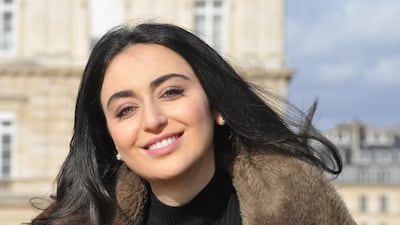Faia Younan’s “sliding doors” moment came in 2015.
Back in Sweden after completing university in Scotland, the aspiring singer considered whether to remain in the Scandinavian country and strive to capture the attention of some of the world's leading western pop music producers, or travel to Beirut and try her luck amid the heavily competitive Arabic pop music industry.
The urgency was triggered by the regional success of To Our Countries.
Released on YouTube the year before, the song and its stark video has Younan singing a medley of patriotic Arab hits by classic artists ranging from Fairouz and Umm Kulthum to Asmahan. Her sister Rihan, meanwhile, provides a spoken-word monologue expressing concern regarding conflict in the Arab world.
The powerful video not only captured the anguish of Arab youth across the region, but also introduced us to Younan's soulful voice, channelling the spirits of such great Arab singers.
Fluent in Arabic and English and at ease with both western and Levant pop styles, Younan tells The National her decision to relocate to Beirut was down to a search for inspiration and identity.
"I moved to Sweden [from Syria] and I went on living in Europe for all these years. I always felt there was a part of me that was missing," she says. "I found that [part] in Beirut, particularly in the underground arts scene with all the great musician and poets.
“To find people that speak my language and get teary eyed when they hear the same songs was so powerful to me. In Beirut, what I have is what I was looking for."
An intimate vibe
That comfort and vitality will be exemplified in Younan’s upcoming concert on Wednesday, February 17, streamed live on the Abu Dhabi Cultural Foundation’s YouTube page.
Pre-recorded before Lebanon's current restrictions on movement came into place, the intimate performance was shot in a Beirut apartment. Backed by a cracking band of local musicians, the show features tracks from both Younan's solo albums, Sea Between Us (2017) and the latest, Tales of the Heart, released in 2019.
While previous Cultural Foundation concerts had artists such as Palestine's Mohammed Assaf and Beninese singer Angelique Kidjo paring down song arrangements to accommodate the smaller bands owing to social distancing, Younan's set remains true to her sound.
Both albums are full of sparse tracks, occasionally embellished with ornate strings, the qanun and percussion. It's the way Younan likes it, as her songs are often story driven.
Tales of the Heart is a case in point. With lyrics contributed by various modern Arab poets, such as acclaimed Lebanese writer Mahdi Mansour, the songs are vignettes featuring Arab characters who struggle, love and pine for better days.
“While I did compose a number of the songs, I like the fact they are a series of stories with poets sharing different experiences,” she says. “By keeping my personal stories out of it, it helps give people some freedom to interpret the songs depending on how it moves them.”
It also generates a sense of community among Younan’s fans who continue to parse the various meanings of the songs online.
“That has really been beautiful and so heart-warming to see,” she says.
"Some songs, for example Ya Qatili and Ghanni, inspired a lot of conversation, some of which are about the lyrics and others about the message behind them. Ghanni, which means sing, had people messaging me to say how the song is helping them in this tough period."
That's biggest compliment of all, she says.
"The songs may all have different meanings and stories. But if you ask me, what links them all together is a sense of hope. That sense of positivity, or that there is light at the end of the tunnel, has always been part of my songs because this is what I believe."
The right move
That self-belief has worked wonders for her career. Younan has performed shows across the Gulf, as well as in France, Jordan, Egypt and Tunisia, over the past four years. Her biggest gig to date remains supporting John Legend in Dubai, at the Coca-Cola Arena last year.
That she achieved such feats in a relatively short time serves to affirm her decision to leave Sweden all those years ago. But does she wonder what could have happened if she had chosen the career of an English pop singer?
"I feel like I still would have a beautiful music career, singing some Arabic songs. But probably the sounds would have been more electronic," she says.
"I feel that everything I did in Beirut, from moving here to the albums I made, has given me a good foundation. What happened was meant to be."
Faia Younan’s concert will stream on Wednesday, February 17 from 9pm on the Cultural Foundation's YouTube channel.


